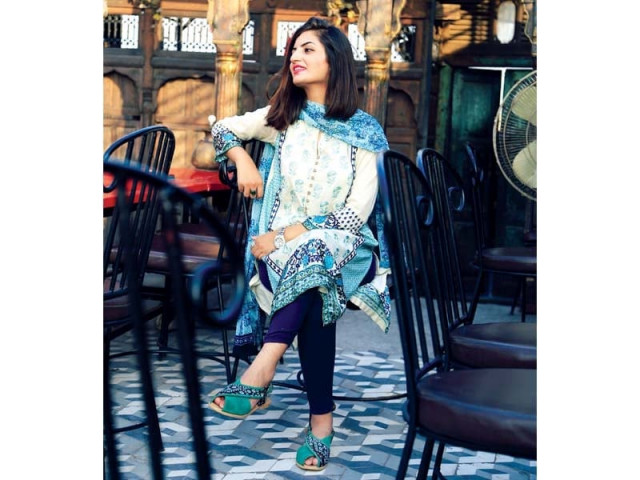Head over heels for Peshawaris
Chapter 13 and Mochari among local brands creating the time-honoured chappal for women

Mochari aims at collecting indigenous fabric from across the country, including khaddi from Punjab, for the Peshawari chappal. PHOTOS: PUBLICITY
The Peshawari chappal is deeply rooted in the cultural and historical setting of the region. It’s a shoe almost every Pathan would say is what he wants to be seen in. Traditionally, the chappal has been worn only by men and made with pure hard leather and a sole, usually made from truck tyres.
But as androgynous fashion becomes all the rage and women embrace waistcoats and kurtas, it seems shoe designers in Pakistan have taken note, with a latest creation being the masculine Peshawari chappals for the ladies. Chapter 13 and Mochari are among the brands that make their own versions of the shoe.

Chapter 13
Mochari hopes to celebrate the work of local artisans and mochis who work with them. “Shoe making, we believe, is an art and we wanted to give these artists and mochis a platform, where they could hand-craft pieces that reflect our rich heritage,” says Hina Fatima, creative head at Mochari. “All the materials used by us are purely made in and made of Pakistan,” she further says.
The design process is a joint effort by mochis and their design team, who collect indigenous fabric from across the country, including khaddi from Punjab, Hyderabadi-embroidered cloth from interior Sindh and carpet cloth from Peshawar. Mochari’s range includes lace-ups, pumps and sandals and most recently, their Peshawari chappals that were designed especially for Eidul Fitr.
https://tribune.com.pk/wp-content/uploads/2015/07/217.jpg
“We wanted to come up with something traditional and Pakistani yet different for Eid, so we came up with Peshawaris. The entire collection denotes unity, an approach that we’ve tried to put forward this Eid,” explains Fatima. Of the demand for Peshawari chappals, she reveals, “Initially, it was a bit erratic, partly because women were a bit hesitant of the word ‘Peshawaris’ since it’s associated with men.” Luckily, trends and mindsets have changed. “Now, the demand has markedly increased, which means that the team here is really busy meeting orders.” Mocharis’ Peshawaris for women are priced at Rs2,500.

Mochari
Chapter 13 co-owner Qurutulain Ansari shares, “I was tired of seeing the saturation of China- and Thailand-imported shoes at lower prices because of their poor quality.” Ansari, who’s part of the sister duo behind the brand, belongs to a family of shoe manufacturers, Milli Shoes. “The skill of our artisans was only being utilised in the clothing industry and, unlike in the clothing business, bulk production is required to stay afloat when it comes to shoes,” she adds.
The brand began making Peshawari chappals early last year when they started with three samples. With the positive response that they garnered, the brand made them a permanent part of their range. Their Peshawari chappal is priced between Rs2,850 and Rs3,450, based on the embellishments and materials used. They share that the Gulabo Peshawari is their bestselling chappal. “All our shoes are designed and made in-house and we have our office and workshop set in Anarkali, Lahore,” says Ansari. Their entire range includes khussas, kohatis, loafers and flats along with Peshawari chappals. Chapter 13 stocks at Milli Shoes and Liberty, and Látelier in Islamabad.

Brought to the limelight in the 1980s by former cricketer and politician Imran Khan, the Peshawari chappal is still admired by many. In recent times, the Peshawari chappal became the centre of a global fashion debate when Paul Smith made a similar shoe last year, calling it the ‘Robert’ and selling it for $500 as opposed to the local ones, which cost around $15. This prompted debate on cultural appropriation, with netizens calling for Pakistani artisans to be given credit for mastering the trend. As a result, Paul Smith changed the name of the sandal from ‘Robert’ to ‘patent-leather strapped shoe’ and added the line ‘Inspired by the Peshawari chappal’.
Published in The Express Tribune, July 9th, 2015.
Like Life & Style on Facebook, follow @ETLifeandStyle on Twitter for the latest in fashion, gossip and entertainment.



















COMMENTS
Comments are moderated and generally will be posted if they are on-topic and not abusive.
For more information, please see our Comments FAQ